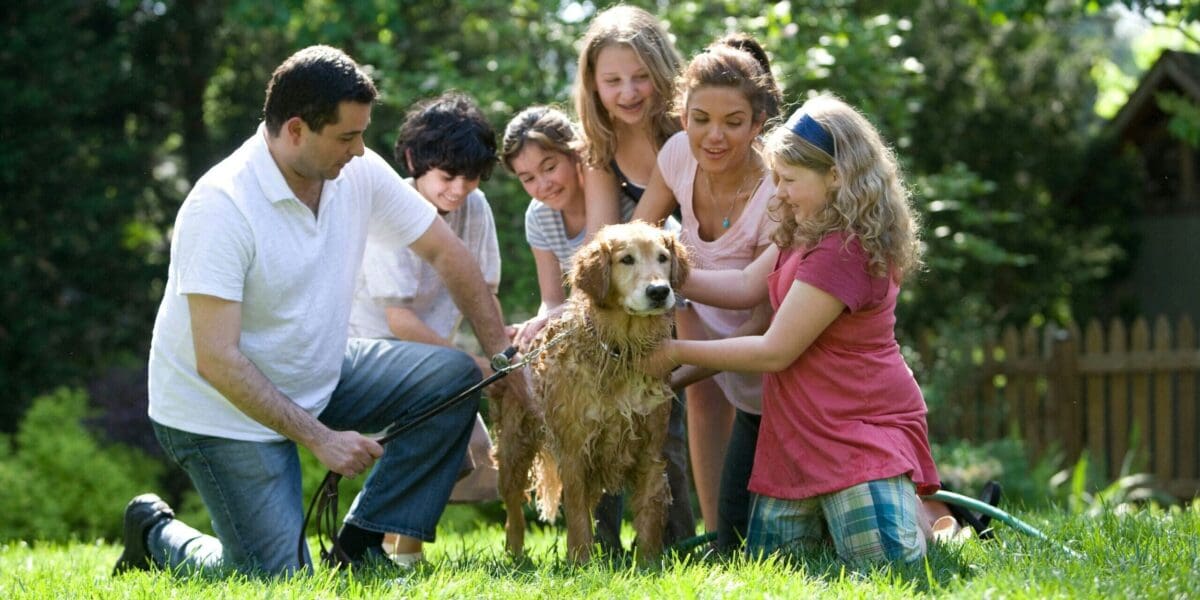Discover the myriad benefits of family pet ownership! Learn life lessons in care, loss, and empathy. Enhance communication, creativity, and responsibility with pet interaction. Improve physical and mental health while preventing allergies and boosting immunity. Choose a pet that suits your lifestyle and energy. Experience educational rewards and essential skill development. Grow emotionally and strengthen family bonds through pet companionship. Uncover a world of possibilities by embracing the joys and challenges of having a furry friend by your side.
Some Key Points
- Teaches responsibility, empathy, and respect through pet care.
- Enhances communication skills and promotes physical activity.
- Improves physical and mental health, boosting immune responses.
- Educational rewards include cognitive development and social skill enhancement.
- Choosing a pet aligned with lifestyle ensures harmonious relationships and family benefits.

Life Lessons Learned Through Pet Ownership
If you’re considering bringing a family pet into your home, you’ll soon discover the valuable life lessons your children can learn through pet ownership. Taking care of a pet teaches your children about pet care, ensuring they understand the importance of feeding, grooming, and providing a safe environment for their furry friend. Additionally, when a pet passes away, children experience loss and grief, helping them understand the cycle of life and the need for compassion during difficult times. Through these experiences, your children develop empathy, responsibility, and respect, shaping them into caring individuals who appreciate the bond between humans and animals. Embracing these lessons through pet ownership creates a foundation for your children to become compassionate and understanding individuals.
Skills Development Through Pet Interaction
Engaging with pets regularly fosters the development of essential skills in children. This interaction not only brings joy but also helps in honing valuable abilities that can benefit your child’s growth and well-being. Here are some ways in which skills can be enhanced through pet interaction:
- Training Techniques: Teaching your pet tricks or commands can improve your child’s communication skills as they learn to give clear instructions and cues.
- Playtime Benefits: Playing with pets promotes physical activity, enhances coordination, and fosters creativity in children through imaginative play scenarios.
- Responsibility Building: Assigning tasks like feeding or grooming pets instills a sense of duty and accountability in children, preparing them for future responsibilities.
Health Benefits of Having a Family Pet
Regular interaction with your family pet can lead to improved physical and mental health for both children and adults. Having a pet can help prevent allergies by stimulating the immune system through exposure to pet dander. Children living with dogs may experience fewer ear infections and respiratory issues. Research indicates that early exposure to pets can aid in the development of a robust immune system, protecting against common allergens. Pets contribute to better respiratory health and can enhance the immune responses of children. By spending time with your pet, you not only strengthen your physical health but also boost your mental well-being. The bond formed with your family pet can have significant positive effects on your overall health. This connection between pets and health highlights the remarkable role animals play in human lives. Specifically, the dogs and baby immunity benefits are well-documented, showcasing how early interactions with dogs can fortify a child’s defense against certain illnesses. Beyond physical health, pets provide emotional support, reducing stress and fostering a sense of companionship that enhances overall well-being.
Choosing the Right Pet for Your Family
When deciding on the perfect pet for your family, consider your lifestyle and activity levels to guarantee a harmonious relationship.
- Pet compatibility assessment: Evaluate your family’s daily routine and living situation to determine which type of pet would best fit your lifestyle.
- Lifestyle considerations: Take into account factors like work schedules, travel frequency, and living space restrictions when selecting a family pet.
- Family pet suitability: Choose a pet that aligns with your family’s energy levels and interests to guarantee a fulfilling companionship experience.
Educational Rewards of Pet Ownership
Consider how owning a pet can greatly enhance your child’s educational development through valuable life lessons and practical learning experiences. Academic motivation can be boosted as children learn responsibility, empathy, and social skills through caring for a pet. The cognitive development that comes from understanding an animal’s needs and behavior can be invaluable. Learning responsibility through feeding, grooming, and exercising a pet teaches children about commitment and consistency. Emotional bonding with a pet can enhance your child’s emotional intelligence and provide a sense of companionship that supports their learning journey. The bond formed between a child and their pet can serve as a foundation for developing essential life skills that contribute to their overall growth and well-being.
Emotional Intelligence Growth With Pets
Enhance your child’s emotional intelligence through the nurturing bond formed with a family pet. Pets offer pet therapy benefits, aiding in emotional regulation. The bonding experiences shared with pets foster empathy development, teaching children to understand and connect with others on a vital level. Through interactions with pets, children learn to regulate their emotions, recognize the feelings of others, and respond with kindness and compassion. This bond creates a safe space where children can express themselves freely, learn to manage stress, and develop resilience. By engaging in activities like playing, walking, or cuddling with their pets, children practice patience, understanding, and emotional awareness, all essential elements of emotional intelligence growth.
Enhancing Family Dynamics With Pets
Adding a furry friend to your family can greatly enrich your household dynamics and relationships. Pets can serve as a bridge that enhances family connections and creates memorable bonding activities. Check out the table below for some ideas on how pets can strengthen your family bonds:
| Bonding Activities | Family Connections |
|---|---|
| Going on family walks | Building trust and teamwork |
| Playing games together | Promoting laughter and joy |
| Caring for the pet | Fostering a sense of nurturing |
Our Conclusion
To sum up, owning a family pet can bring a multitude of benefits to your loved ones. From teaching important life lessons to promoting health and well-being, pets have the power to enhance your family dynamics and create lasting memories. By choosing the right pet that fits your lifestyle and nurturing a bond with them, you can experience the joy and educational rewards that come with pet ownership. Embrace the transformative power of having a furry or scaly companion in your life today!
Some Questions & Answers

How Can Owning a Family Pet Impact Children With Special Needs or Disabilities?
Having a family pet can profoundly impact children with special needs or disabilities. Pets offer therapeutic benefits by providing emotional support and companionship. They can help children with special needs develop empathy, responsibility, and social skills. Pets can also offer a sense of security and comfort, aiding in emotional regulation. The bond between a child and their pet can be a source of unconditional love and understanding, enhancing the well-being of children with special needs or disabilities.
Are There Any Specific Breeds of Dogs or Types of Pets That Are Better Suited for Families With Young Children?
When choosing a pet for your young family, consider breeds like Labrador Retrievers, Golden Retrievers, or Beagles known for their gentle nature and suitability around children. Training techniques can help address behavioral challenges, ensuring a harmonious relationship. Be mindful of safety precautions to prevent accidents or injuries. Researching breeds and their compatibility with children’s needs can guide you in finding the perfect furry companion for your family.
What Are Some Ways to Introduce a New Pet Into a Household With Existing Pets?
When introducing a new pet to your home with existing pets, focus on fostering harmony. Start by creating separate spaces for each pet to feel secure. Slowly introduce them in controlled environments, like short supervised interactions. Observe their body language and behavior to gauge dynamics. Reward positive interactions to encourage bonding. Patience and consistency are key in ensuring a smooth shift for all pets in the household.
Can Owning a Pet Help Families Cope With Stress or Difficult Situations?
Owning a pet can truly help your family deal with stress or tough times. Pet therapy provides emotional support and can be a source of comfort during difficult situations. The bond you form with your pet can bring your family closer together, fostering a sense of unity and support. Through the companionship and unconditional love of a pet, you may find relief from stress and a soothing presence in challenging moments.
How Can Pet Ownership Influence the Development of Leadership Skills in Children?
Owning a pet can positively impact children’s development of leadership skills and responsibility. By caring for a pet, you learn to take charge, make decisions, and guide others. This fosters confidence and empathy as you understand the needs of your pet and lead by example. Taking on the responsibility of a pet helps shape you into a compassionate and capable leader, preparing you for future roles where serving others is essential.



